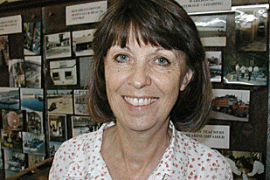‘No trace’ of Briton’s Iraqi killer
Man convicted of killing aid worker Margaret Hassan has reportedly escaped from jail.

‘Heartbreaking’
The lawyers for Hassan’s family said they were told Jassar was recently transferred to a Baghdad jail, after being held in northern Iraq.
But after checking with both facilities, Jassar was not found.
Hassan, whose body has never been found, had lived in Iraq for 30 years before being taken hostage in October 2004, and shot a month later.
The 59-year-old was head of operations in Iraq for the humanitarian group Care International for around 12 years before she was pulled from her car by men in police uniform as she was being driven to work.
Deirdre Manchanda, Hassan’s sister, said the latest development was “heartbreaking”.
“Jassar is known to be part of the gang that kidnapped and killed my sister,” she was quoted by British newspaper the Guardian as saying.
“We have fought for justice for six years only to find that not one member of this gang can be brought to justice.
“It is heartbreaking that he has failed to appear in court. It confirms our fears that he is free.”
The family had been counting on Jassar to reveal where Hassan’s body had been disposed of so that they could give her a proper burial.
Torture allegations
Jassar, 26, from Baghdad’s Jamaa district where Hassan was abducted, was arrested in May 2008.
He had pleaded not guilty to Hassan’s murder, although his defence acknowledged he may have played a part in a blackmail plot.
At last year’s lower court hearing, Jassar was found guilty of “participating in the killing and kidnapping of Margaret Hassan, and of attempting to blackmail her family”.
But his lawyers claimed that an alleged confession put before the court of first instance had been extracted under torture.
Hassan, who held British, Irish and Iraqi citizenship, was shown in several video messages appealing for her life and calling for British forces to withdraw from Iraq.
She had led a team working to provide essential aid to hospitals and helping to restore vital power and water supplies, and was an outspoken opponent of the crippling UN sanctions imposed after Iraq’s 1990 invasion of Kuwait.
Shortly after she died, her family accused the British government of causing her death by refusing to speak to her captors.